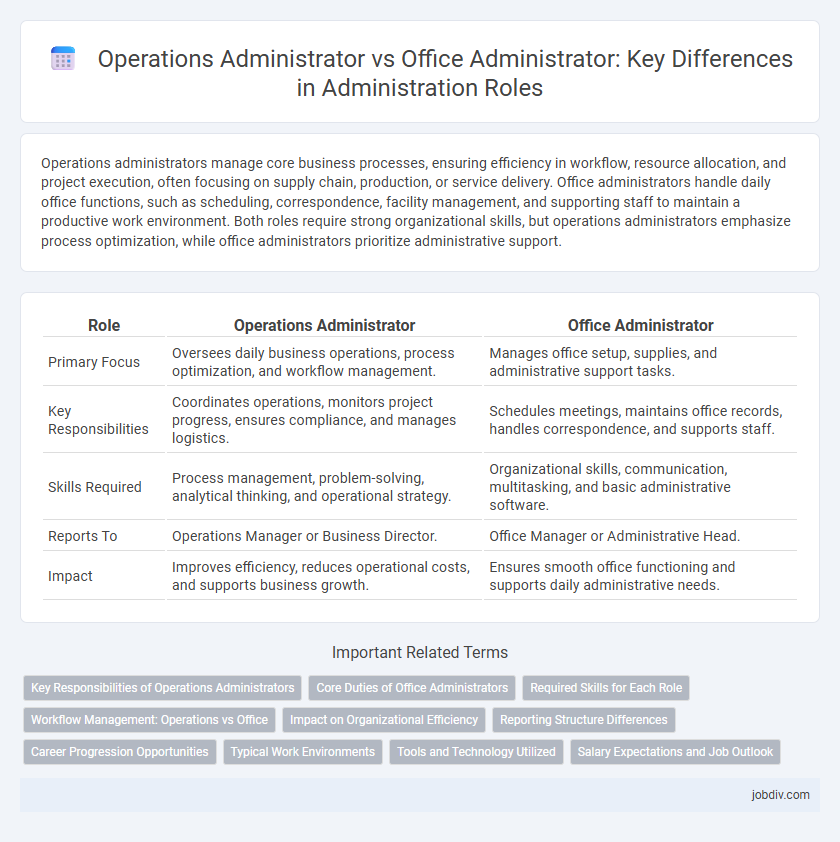Operations administrators manage core business processes, ensuring efficiency in workflow, resource allocation, and project execution, often focusing on supply chain, production, or service delivery. Office administrators handle daily office functions, such as scheduling, correspondence, facility management, and supporting staff to maintain a productive work environment. Both roles require strong organizational skills, but operations administrators emphasize process optimization, while office administrators prioritize administrative support.
Table of Comparison
| Role | Operations Administrator | Office Administrator |
|---|---|---|
| Primary Focus | Oversees daily business operations, process optimization, and workflow management. | Manages office setup, supplies, and administrative support tasks. |
| Key Responsibilities | Coordinates operations, monitors project progress, ensures compliance, and manages logistics. | Schedules meetings, maintains office records, handles correspondence, and supports staff. |
| Skills Required | Process management, problem-solving, analytical thinking, and operational strategy. | Organizational skills, communication, multitasking, and basic administrative software. |
| Reports To | Operations Manager or Business Director. | Office Manager or Administrative Head. |
| Impact | Improves efficiency, reduces operational costs, and supports business growth. | Ensures smooth office functioning and supports daily administrative needs. |
Key Responsibilities of Operations Administrators
Operations administrators manage day-to-day business processes, ensuring efficient workflow across departments by coordinating logistics, monitoring inventory, and overseeing project timelines. Their key responsibilities include optimizing operational procedures, managing vendor relationships, and implementing cost-control measures to improve organizational productivity. Operations administrators also analyze performance data to support strategic decision-making and maintain compliance with company policies and regulations.
Core Duties of Office Administrators
Office administrators handle essential tasks such as managing office supplies, coordinating schedules, and maintaining communication channels to ensure smooth daily operations. They oversee filing systems, prepare reports, and support team members by organizing meetings and handling correspondence. Unlike operations administrators who focus on process optimization and resource management, office administrators are central to maintaining the organizational infrastructure and facilitating efficient workflow.
Required Skills for Each Role
Operations administrators require strong project management skills, proficiency in process optimization, and expertise in supply chain coordination to ensure smooth organizational workflows. Office administrators must excel in communication, calendar management, and basic accounting to efficiently handle daily office tasks and support staff. Both roles demand organizational skills, attention to detail, and the ability to use office software suites like Microsoft Office or Google Workspace.
Workflow Management: Operations vs Office
Operations administrators streamline workflow management by coordinating cross-departmental processes, optimizing resource allocation, and ensuring project milestones are met efficiently. Office administrators focus on managing daily office functions such as scheduling, correspondence, and facility upkeep to maintain a seamless work environment. Their roles complement each other, with operations administrators targeting organizational efficiency and office administrators securing operational stability.
Impact on Organizational Efficiency
Operations administrators streamline workflows by coordinating cross-departmental processes and optimizing resource allocation, significantly enhancing organizational efficiency. Office administrators maintain day-to-day administrative tasks, ensuring smooth office functionality and supporting staff productivity. The combined impact of these roles fosters a balanced operational environment, driving overall business performance and efficiency.
Reporting Structure Differences
Operations administrators typically report to the Operations Manager or Director, focusing on workflow efficiency and process management. Office administrators often report to the Office Manager or directly to senior management, emphasizing facility management and administrative support. This reporting structure reflects their distinct roles in organizational hierarchy and operational focus.
Career Progression Opportunities
Operations administrators typically advance into roles such as operations manager or project coordinator, leveraging experience in process optimization and logistics management. Office administrators often progress to office manager or executive assistant positions, focusing on administrative support and team coordination skills. Both pathways offer growth potential, with operations roles emphasizing efficiency improvements and office roles prioritizing organizational leadership.
Typical Work Environments
Operations administrators typically work in dynamic, fast-paced settings such as manufacturing plants, logistics companies, or corporate operations centers, where process optimization and supply chain coordination are essential. Office administrators usually operate in structured office environments like corporate headquarters, law firms, or educational institutions, managing clerical tasks, scheduling, and communication flow. Both roles demand adaptability but differ in focus, with operations administrators leaning towards operational efficiency and office administrators prioritizing administrative support.
Tools and Technology Utilized
Operations administrators primarily use enterprise resource planning (ERP) software, project management tools like Asana or Trello, and data analytics platforms to streamline workflow and optimize business processes. Office administrators often rely on office suite applications such as Microsoft Office or Google Workspace, scheduling software, and communication tools like Slack or Microsoft Teams to manage day-to-day office functions efficiently. Both roles integrate cloud-based solutions to enhance collaboration and operational efficiency.
Salary Expectations and Job Outlook
Operations administrators typically command higher salary expectations, averaging around $65,000 to $85,000 annually, due to their involvement in managing business processes and improving operational efficiency. Office administrators earn between $40,000 and $55,000 per year, reflecting their focus on routine clerical tasks, office coordination, and administrative support. Job outlook for operations administrators is strong, with growth driven by increased demand for streamlined operations, while office administrators face moderate growth influenced by automation and shifting workplace dynamics.
operations administrator vs office administrator Infographic

 jobdiv.com
jobdiv.com